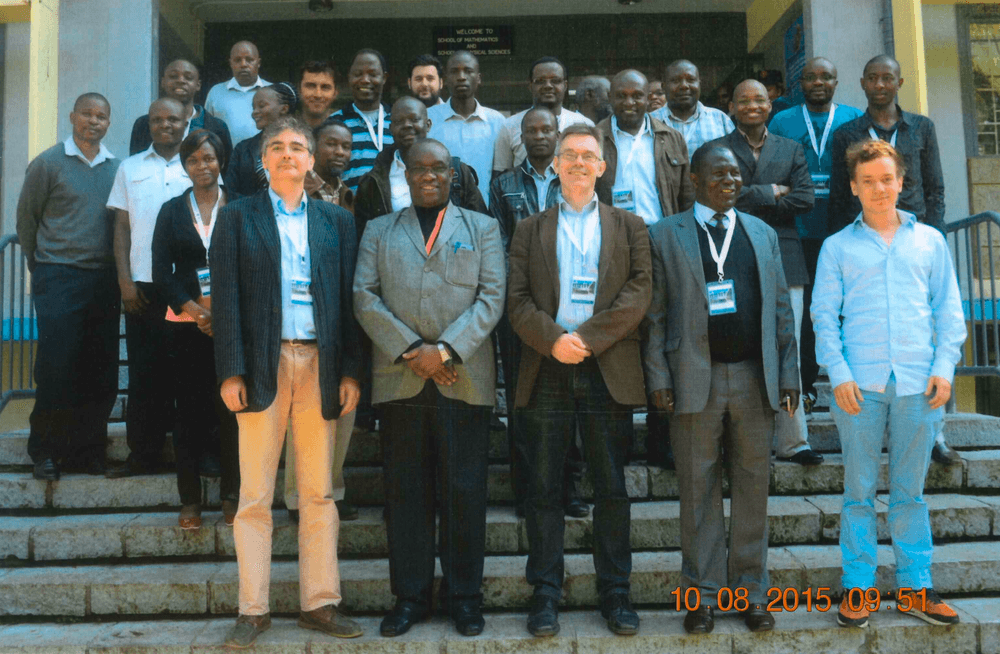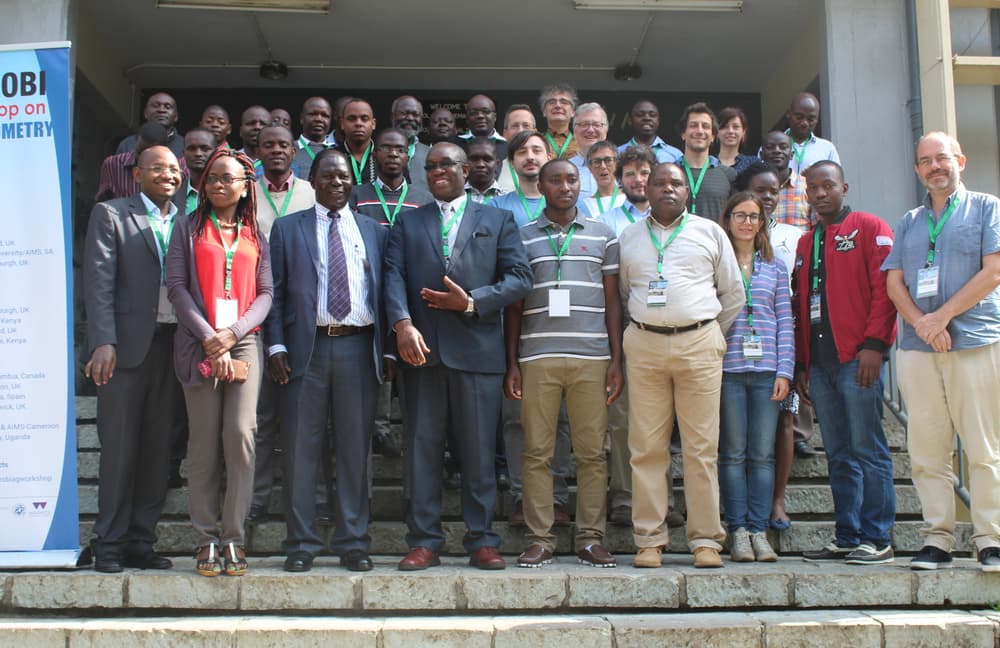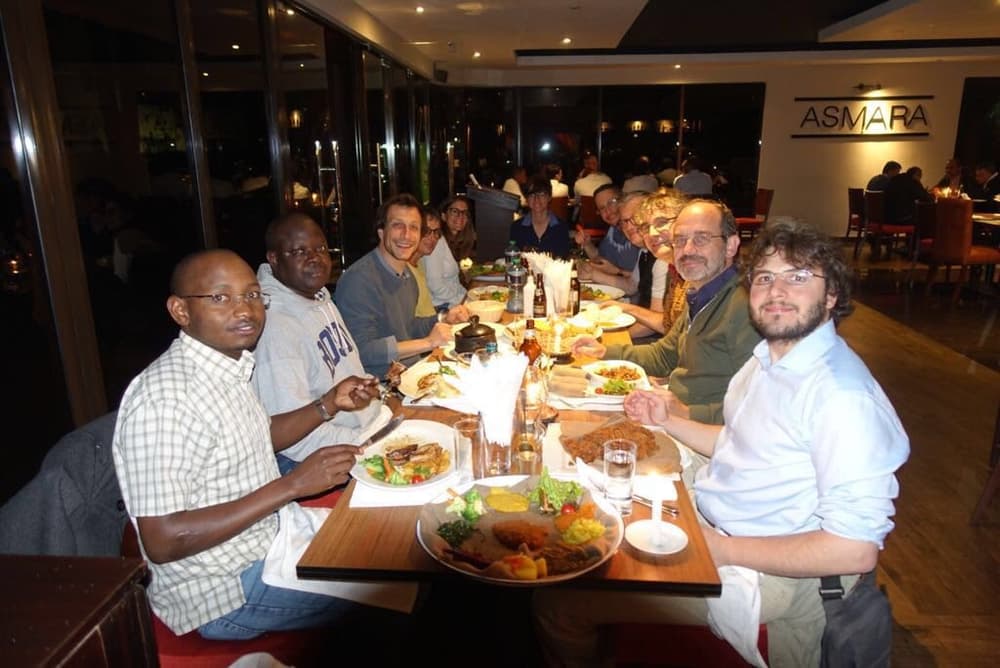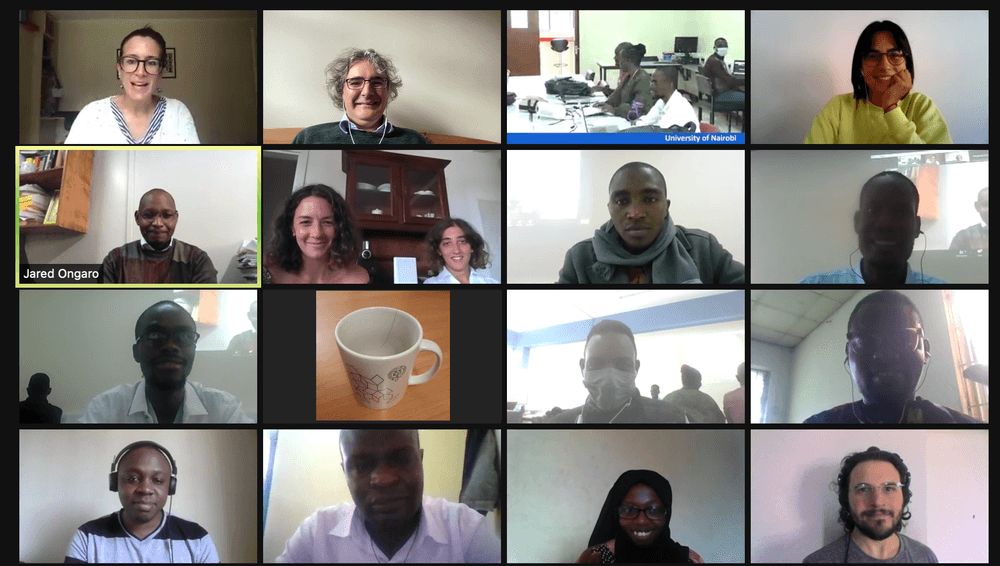Introduction
Since August 2015, a yearly workshop in algebraic geometry has been held at the University of Nairobi, a regular event that helped to establish a strong connection between a group of international researchers and local professors and students in Nairobi. The origins of the workshops go back to a 2014 summer school on algebraic geometry held in Mombasa, Kenya [1 T. Denton, Mathematics in Kenya. Notices of the AMS 62, 754–759 (2015) ]. This school was run by a small but active local group: a senior algebraist, Claudio Achola, and two young geometers, Damian Maingi and Jared Ongaro, under the auspices of the Eastern African Universities Mathematics Programme1www.isp.uu.se/what-we-do/mathematics/networks/eaump/. At the school, discussions between locals and internationals led to the idea that the growth of the local research community would be best helped by a regular event.
The workshops held2https://sites.google.com/site/nairobiagworkshop/home between 2015 and 2019 varied in length, content, and scope, from a few days of lectures by one or two internationals to large-scale meetings. One of their core functions was to provide ideas for Masters projects for the local student cohort; indeed, during this time, 11 students completed Masters theses in geometry in Nairobi, some moving on to international PhD positions. Another role that the workshops have taken on is to establish an Africa-wide network of algebraists and geometers.
In 2021, during the second year of the COVID-19 pandemic, we organized a remote workshop. The aim of our article is to compare this event to one of the earlier ones, and to draw some conclusions.
Participants of the first workshop in 2015
©All rights reserved.
The 2018 workshop
In August 2018, the fourth workshop in algebraic geometry was held in Nairobi over two weeks. Participants included several internationals, over 20 African students (both MSc and PhD), as well as senior African mathematicians.
Finding good topics for such a workshop always presents a challenge: on the one hand, one would like to introduce students to current research areas; on the other hand, there is the danger of choosing topics that are too advanced and do not connect with their mathematical background. This is particularly true for a workshop in algebraic geometry, a highly technical subject with many requisite preliminaries.
On this occasion, the first week allowed us to try to bridge this gap. Introductory lectures were given on the general theory of algebraic varieties, on blow-ups and resolution of singularities, as well as on elliptic integrals and Picard–Fuchs equations. A more challenging lecture provided an explanatory overview of the birational classification of algebraic varieties and the minimal model program. The morning lectures were complemented by exercise classes.
Participants of the 2018 workshop
©All rights reserved.
We found that the level of prior mathematical knowledge of the students varied a lot: some of them had already been exposed to advanced material, while others had less background in pure mathematics. To reach such a diverse audience, the lectures were made as self-contained as possible, occasionally referring to deeper mathematical content that could be appreciated by the more experienced. A detailed list of references was also prepared to help students start approaching the literature. For the exercise sessions, problems had been prepared for a variety of skill levels. An informal atmosphere developed which stimulated discussions, helped also by social interactions during lunches and coffee breaks. We noted a significant change in the students’ attitude over the course of the week; by the end, they were much more relaxed and eager to ask questions.
The second week consisted of research-level talks, to present students with active research areas and to engage the local group of researchers. The topics varied from enumerative problems to moduli theory and mirror symmetry. There was time for students’ presentations, allowing junior participants to present their projects in front of an international audience and get constructive feedback. A professional development session was also held, including advice on CV writing, networking, grants and funding opportunities, resources, and workshops. International lecturers agreed to be available for further advice to students; some relationships continued for months, and sometimes years, incorporating mathematical discussions and career advice.
To end this section on a personal note, we would like to mention that one of the speakers during the second week of the workshop was Professor Marco Garuti, Academic Director of AIMS Cameroon, on leave from the University of Padova. For many of us, this was our only occasion to meet Marco; we got to know a considerate man, a skilled academic leader and someone strongly committed to the cause of African mathematics. His untimely death in July 2021 touched us all deeply.
Speaker dinner in Nairobi, with the late Marco Garuti (second on right)
©All rights reserved.
The 2021 workshop
A planned 2020 workshop had to be postponed due to the onset of the COVID-19 pandemic. One year later, the global health crisis still made it impossible to organize an in-person international meeting. At the same time, the community in Nairobi felt the need for an event to support master students, and to maintain established links. We therefore decided to organize the sixth workshop as a hybrid event in August 2021. Groups of participants at Nairobi and Makerere Universities gathered in lecture rooms equipped with projectors and blackboards for exercise sessions. Further individuals from other Kenyan universities, Nigeria, Cameroon, Congo and South Africa participated from private computers or phones. For those who wished to actively participate, the quality of the local internet connection appeared to be largely satisfactory. The total number of active participants was around 30.
We used Zoom for lectures and problem sessions, while a Slack space was set up to share materials and communications; dedicated channels helped with the organization of workshop activities, student presentations, and the professional development session. Students found Slack a very useful tool to access all the information and materials, as well as to contact the lecturers and the other students in an informal and quick way.
The workshop consisted of mini-courses on toric varieties, Hurwitz theory and computational methods with applications to chemical reaction networks and robotics. Problem sessions were run in Zoom break-out rooms, separately for the groups of students gathered at Nairobi and Makerere, and for individual students elsewhere, with tutors surfing from one Zoom room to another to follow the students’ work and to answer questions. The engagement of the students was noticeably better and the interactions more intense in the groups that were physically in the same room and could discuss at a blackboard. In the fully remote group, the participants sometimes used the whiteboard option on Zoom and sometimes typed solutions to exercises, but it was hard to incorporate mathematical arguments without an appropriate editing software. The online setting was better suited to the computer-based problem sessions of the last mini-course: students could share their screens and show directly their lines of codes to the rest of the group. The group in Nairobi also used the opportunity to test the Sangaku online tutorial system, developed by Neil Strickland, University of Sheffield, to be employed alongside a video meeting system such as Zoom. It allows users to type in answers rendered in LaTeX markup language or upload a scan of a solution using an inbuilt phone or webcam interface. This approach was not uniformly used across the workshop and requires further development.
A day during the week was set aside for a joint session with the African Mathematics Seminar3https://sites.google.com/view/africa-math-seminar/home, with talks by senior speakers Diane Maclagan and Bernd Sturmfels, on subjects such as tropical geometry and computer-assisted enumerative geometry. As in 2018, there was a professional development session, as well as a session for student presentations.
To better understand the student experience, feedback was collected using questionnaires as well as direct interviews with participants ranging from BSc to PhD students. Students were generally satisfied with the workshop and its organization; they found the courses interesting and useful, with the mathematical content at the right level. Many participants stressed the relevance of facing new topics or being presented with known topics from a different angle. As one student put it,
If you know something or you are already interested in something then [attending the workshop] helps you to grasp more and learn more but if you don’t know [yet the material discussed], like for the undergraduate students, [then participating in the lectures] helps you to really open up and see these are problems, potential problems that arise in this area.
Students who attended the workshop fully remotely highlighted the fact that they would have preferred to follow problem sessions, and to interact with other people to solve problems, in person, making the following points:
When [the workshop] is physical, I can move around the room, it gives you the whole feeling of the mathematics in the environment. When people are talking about maths, when people are trying to solve some problems it’s better to be in person. I think that we can follow the conference online but when we need to discuss between students I think it’s better [to be together] because some students sometimes are not concentrating ‘cause when they find that a problem is difficult they just try to leave the problem, they don’t discuss, they just keep quiet. But if we are together we can try to see, ok what we can do here, we can discuss a little bit more.
Being in the same physical space gives one the opportunity to discuss a problem and involve mates in the resolution, but also to understand other groups’ issues, help them, and learn from them. This kind of direct communication is very difficult in an online format. The intensity of remote interaction strongly depends on the students’ approach, but also on the organization and the management of the sessions. Future online events will benefit from dedicated strategies4See [2 A. Matveeva and N. Nikolaev, Junior Global Poisson workshops. EMS Magazine 119, 40–41 (2021) ] for some ideas of how to design activities to stimulate social interactions in an online space. that further encourage debate and discussion among students.
A cross-section of the participants at the closing ceremony of the 2021 workshop
©All rights reserved.
Conclusions
The 2018 workshop provided many opportunities for informal exchanges during problem sessions, lunch and coffee breaks, that created a highly collaborative atmosphere. In contrast, the 2021 remote workshop largely lacked these personal interactions. It is also likely that the intensity of the students’ attention to lectures was reduced compared to a live event. Nevertheless, in our view, the remote event was a successful experiment; it elicited positive feedback from the participants. We believe that one of the key reasons for its success was that it built upon years of live connections and collaborations between the international and the local mathematical community.
An online setting presents many challenges, but it also has obvious advantages. Compared to an in-person event, a remote one can be organized with a fraction of the funds, especially in Africa. The reduction of carbon emissions is another major advantage. As opposed to a completely online event, where each participant connects to the call individually, the experience is more engaging and interactive if groups of students can gather in the same location and attend together. One idea that emerged is that for future events, a group leader could be chosen from each group to enable good communication between the remote session facilitator and the local group.
In conclusion, it seems likely to us that remote events will not fully replace in-person events. But even for live meetings, senior talks and professional development sessions can have remote speakers, allowing for contributions from people from all over the world who are not able to travel to Africa. On the other hand, remote events can form a useful complement to an ongoing in-person engagement programme between different African departments and the international research community.
Acknowledgements We would like to thank Aurelio Carlucci, Margherita Pagano and Bianca Gouthier for help during the exercise sessions of the 2021 workshop. The workshop was financially supported by EPSRC GCRF grant EP/T001968/1 “Capacity building in Africa via technology-driven research in algebraic and arithmetic geometry”, held by BS at the University of Oxford. CB’s participation was supported by grant PRIN 2017 “Moduli Theory and Birational Classification”, held at the University of Trento.
- 1
- 2
- 3
- 4
See [2 A. Matveeva and N. Nikolaev, Junior Global Poisson workshops. EMS Magazine 119, 40–41 (2021) ] for some ideas of how to design activities to stimulate social interactions in an online space.
References
- T. Denton, Mathematics in Kenya. Notices of the AMS 62, 754–759 (2015)
- A. Matveeva and N. Nikolaev, Junior Global Poisson workshops. EMS Magazine 119, 40–41 (2021)
Cite this article
Chiara Bonadiman, Jared Ongaro, Diletta Martinelli, Balázs Szendrői, Live and remote: Nairobi workshops in algebraic geometry. Eur. Math. Soc. Mag. 124 (2022), pp. 38–41
DOI 10.4171/MAG/89



